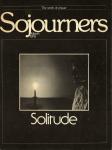A complaint I hear frequently nowadays is that criminals have more rights than decent people. Many citizens express concern about the victimization of society by dangerous people.
The "rights" vocabulary wasn't in vogue in Jesus' time, but it seems as if the way that the New Testament writes his stance toward dangerous people might be worth pondering in our world of padlocks, burglar alarms, security guards, muggings, and rumors of muggings.
Remember the 10 lepers? One biblical commentary I studied points out that the word translated as leprosy doesn't strictly mean Hansen's Disease, but a whole group of conditions which society considered dangerous. People with these conditions were treated as outlaws. Others avoided them. No one wanted to meet them on the road, and society employed maximum security methods to isolate them from "clean" people. The stories of the early church portray Jesus, not only as one who met the lepers and talked to them, but as one who even may have touched them.
I don't know what you would do, but if 10 drug addicts approached me on a city street, even in broad daylight, I, a professed follower of Jesus, would probably faint dead away from sheer fright.
Remember Simon the Zealot, a member of the local Palestine liberation movement of those days? Jesus chose him as one of the twelve. With our ways of obtaining safe streets and world peace, I wonder if Simon could get security clearance to enter the country, let alone be chosen for a parish council.
Remember how the Roman IRS had trouble getting the coin of tribute from Peter? What kind of people did the New Testament writers think Jesus hung out with? Remember the ears of corn his friends got caught with, not to mention who drank all the wine at Cana?
Besides the lepers, there were: the woman on death row; the one taken in adultery; the Samaritan woman with five husbands; Peter, who sliced off a policeman's ear; and Zaccheus, who sounds like an apt suspect for a Jerusalem-gate hearing. How many in all? Only Jesus knows.
Look at what the early church remembers about his recommendation for a guest list. "When you have a reception, invite the beggars and the crippled, the lame, and the blind" (Luke 14:13). Our society does have some legislation about the rights of the handicapped, but beggars are suspect. It may be commonplace to send a donation to a charitable organization, but the first and the most observed of the commandments for survival in the city is never to open the door to a beggar.
Please don't misunderstand me. I have no intention of boycotting the burglar alarm companies, and I certainly don't want to imply that Jesus promoted mugging, cheating, adultery, or violent crime. I know he sent the lepers to the priest to show that they were "clean." And it does sound like Zaccheus changed his investment policy after Jesus' audit.
But remember that story about the Pharisee and the publican? Remember how the Pharisee kept the law, paid his taxes, and controlled his cholesterol intake twice a week? (I wonder if he jogged, too.) Whose side is Jesus on? To whom does he promise rights in his kingdom?
Entry seems to require a certain nearness to dangerous people, like "the hungry, the thirsty, the naked, the imprisoned" (Matthew 25:31-46). While it is sometimes possible to serve those in such circumstances by long-distance measures, the way a society treats its dangerous people seems to bear a relation to the coming of the kingdom.
It's not likely that Caiaphas or Pilate got uptight because of Jesus' tax deductions for charity. His stance toward the dangerous was radical, not only because he demanded a personal conversion of the dangerous ones (who would object to that?), but also because he required a new relationship between the dangerous and the decent. Both Pilate and Caiaphas recognized the implications. Hence the media campaign that made "Crucify him" a popular refrain. Could the complaint "Criminals have more rights than decent people" be a line borrowed from the brother of the Prodigal Son? He didn't like that fuss made over his hungry, thirsty, poorly-clad, delinquent brother.
Just as that celebration wasn't complete until the older brother adopted the father's affirmative action program, so the kingdom cannot develop until the decent come in from the fields and share the fatted calf with the dangerous ones.
The rights we have to hang on to are those assured us by Jesus' death and resurrection. We claim them, saying, "Forgive us our trespasses, as we forgive those who trespass against us."
Wherever Christians follow Jesus' affirmative action program, the fatted calf will be killed, the older brother may still object, and modern Pilates will fear the people; but the blind will see, the deaf will hear, and the poor will have the gospel preached to them.
Where that happens, Christians will be like a sign that says, "Danger Ahead. Kingdom Under Construction."
When this article appeared, Elizabeth V. Roach, a Maryknoll sister who worked in Latin America for 23 years, was on assignment in Maryknoll, New York.

Got something to say about what you're reading? We value your feedback!
